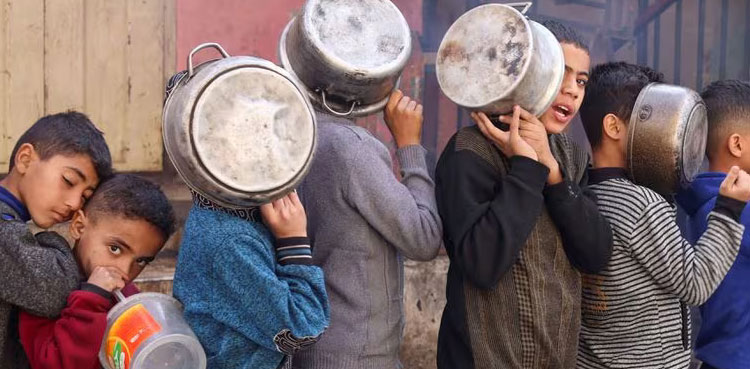Gaza children displaced by Israel’s military offensive are suffering from hunger and malnutrition. With limited access to food and water, families are struggling to feed their children. The dire situation has led to weight loss, illness, and trauma. Aid distribution is insufficient, leaving many in desperate need of assistance. The humanitarian crisis continues to worsen.

RAFAH: The children displaced to south Gaza were craving chicken, but all their mother had left to feed the family for the day was a tin of peas donated by a man who took pity on her when he saw her crying.
Left homeless by Israel’s military offensive against Hamas, like most of Gaza’s 2.3 million population, Tahany Nasr was in a tent camp in Rafah focused on one thing only: how to find enough food and water to get everyone through another day.
She said her children had lost weight and were getting dizzy spells because they were not eating enough.
“I’ve been begging to feed my children and don’t find anything. I go to Social Affairs, they say go to the mosque. I go to the mosque, they say go to the Affairs,” she said, referring to Gaza’s welfare ministry which normally organises distributions of basic goods like flour to people in hardship.
Hunger has become the most pressing of the myriad problems facing hundreds of thousands of displaced Gaza Palestinians, with aid trucks able to bring in only a small fraction of what is needed, and distribution uneven due to the chaos of war.
Some trucks have been stopped and looted by people desperate for food, while swathes of the devastated territory are beyond their reach because access roads are active battlegrounds.
Even in Rafah, which has a crossing to Egypt through which aid trucks enter and is an area where the Israeli army has told civilians to seek refuge, the dearth of food and clean water is so severe it is causing people to lose weight and get ill.
“We have started to see people coming in emaciated,” said Samia Abu Salah, a primary care doctor in Rafah.
She said weight loss and anaemia were common and people were so weak and dehydrated they were more susceptible to chest infections and skin conditions. Babies and children were particularly at risk, and their growth would be affected.
A MEAL OF ONIONS
“My children just told me today that they were craving chicken. Where would I find them chicken? Where? Do I know? May Allah save us,” said Nasr, breaking down in tears as she spoke.
“We haven’t received any food in two days. How do I fool my children? With some pasta? Some lentil stew? If I could find it!” she said, adding that sometimes she had resorted to making meals out of only onions.
Nasr went into her tent to fetch the tin of peas she said a kindly man had given her, even though he had bought it for himself. “This is it. This can is all we have for a whole day,” she said, holding it up, her voice rising in anger.
Far from being an extreme case, the account given by Nasr echoed stories told by many interviewees who spoke to Reuters in Rafah and elsewhere. People spoke of eating only once a day, of inadequate meals with insufficient nutrition, of rationing water, of children getting diarrhoea from drinking dirty water.
The war was triggered by Hamas fighters who stormed into southern Israel from Gaza on Oct. 7, killing 1,200 people including babies and children and capturing 240 hostages of all ages in the deadliest day of Israel’s 75-year history.
Israel has responded with a military assault on the densely populated, Hamas-run Gaza Strip, which has killed nearly 20,000 people, mostly women and children, according to health officials there, and wrought a humanitarian catastrophe.
Maha Al-Alami, a displaced woman sheltering in a school in the southern Gaza city of Khan Younis with eight children and grandchildren, said everyone was traumatised by the experience of hunger.
“I’m telling you, once the war is over, God willing, the Palestinian people should sit before psychiatrists,” she said.
The plight of Gaza children suffering from hunger is a deeply concerning issue that cannot be overlooked. In the midst of this tragedy, it is critical for us all to come together and take meaningful action to alleviate the suffering of the young ones who are enduring the physical and emotional toll of malnutrition. The impact of hunger on a child’s well-being cannot be understated – it impedes their growth, learning, and overall development, casting a dark shadow on their future. As a global community, it is imperative to support initiatives that provide essential food assistance and nutrition programs to these vulnerable children. By raising awareness and advocating for sustainable solutions, we can make a difference in the lives of these resilient youngsters, ensuring that they have the nourishment they need to thrive. Through collaborative efforts and compassionate engagement, we can work towards a future where no child in Gaza has to endure the crippling effects of hunger.
Source: ARY NEWS
Gaza, hunger, displaced, children, food scarcity, aid trucks, distribution, emaciation, illness, desperation, weight loss, anaemia, chest infections, deprivation, clean water, malnutrition, war, Hamas, Israel, humanitarian crisis, trauma, psychiatrists.
Children in Gaza are suffering from severe hunger due to the scarcity of food and clean water after being displaced by Israel’s military offensive against Hamas. Aid trucks are unable to meet the overwhelming need, leading to weight loss, illness, and desperation among the population. Emaciation and anaemia are common, particularly among babies and children. The war has triggered a humanitarian catastrophe, leaving many families with inadequate meals and insufficient nutrition. The situation has traumatized many, prompting the need for psychological support once the conflict subsides.
Disclaimer:
This content is AI-generated using IFTTT AI Content Creator. While we strive for accuracy, it’s a tool for rapid updates. We’re committed to filtering information, not reproducing or endorsing misinformation. – Khabristan.pk for more information visit privacy policy








Leave a Comment